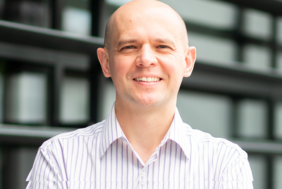Archiv Mitteilungen

Ukrainian in modern Ukrainian society: linguistic, historical and sociological aspects
A course by Vasyl Starko, guest lecturer in April 2021 at ABZ in Jena
The Aleksander-Brückner-Zentrum Jena is happy to offer the following course (Seminar) in April 2021 to students of the Unibund area:
Ukrainian in modern Ukrainian society: linguistic, historical and sociological aspects (Vasyl Starko, Ukrainian Catholic University Lviv, r2u group)
NOTE: Knowledge of Ukrainian is not a prerequisite for attending the course!
Please note there will be a preparatory meeting on March 16th at 4:15 pm on Zoom - please come if you are thinking of taking the course
The lecturer: Vasyl Starko is a cognitive linguist, a specialist in Ukrainian corpus linguistics and a pioneer of digital humanities in Ukraine. We are looking forward to welcome Prof. Starko as a guest researcher at the Aleksander-Brückner-Center in Jena through April 2021!
When: Preliminary dates for the course are April 9th/10th, 16th/17th, 23th/24th and 30th each with 2 x 90 min, adding up to a full 2 SWS course. There will be a preparatory meeting in March.
Who and where: The course is aimed at both BA and MA levels, with essay and reading requirements adjusted accordingly. Interested students from Jena, Halle and Leipzig from all disciplines are invited to take part in the course. Since the course will take place on ZOOM, students from other universities are welcome, too! If the pandemic situation and weather permits, we will consider supplementing the online sessions with a personal meeting outside.
Credit points: Students earn 3 ECTS for active attendance, and 5/6 ECTS for attendance and an essay (Seminararbeit). Feel free to contact us if you have questions!
Course outline (will be adjusted after preparatory meeting to meet students’ interests): This course will be focused on the Ukrainian language in the 20th and 21st centuries and will combine the perspectives of linguistics (especially sociolinguistics and language planning) and history (external history of language).
The key objective is to understand how a variety of historical, societal, and purely linguistic factors have shaped modern Ukrainian and its status in the Ukrainian state today. We will first look at what happened in the tumultuous 20th century: from early efforts atstandardizing Ukrainian to the Soviet Russification policy and its lasting impact. We will then move to modern times and consider the place and functions of Ukrainian in society in addition to the changes it is undergoing. Finally, we will briefly explore the computational tools available for the study of Ukrainian.
Classes will be a combination of lectures and discussions.
Tentative plan:
1. Ukrainian and Ukrainians in the Soviet Union.
2. Galicia’s role in the formation of Ukrainian.
3. Standardization and unstandardization of Ukrainian.
4. Dictionaries as a mirror of language planning.
5. Multilingual Ukraine: Ukrainian, Russian, and mixtures (surzhyk).
6. Languages and identities in post-Soviet Ukraine.
7. Language policy in modern Ukraine.
8. Language change at the turn of the 21st century.
9. Computational approaches to the study of Ukrainian.
10. Building a corpus of modern Ukrainian: challenges and complexities.
For registration and further questions please turn to: nikolaj.popov@uni-jena.de